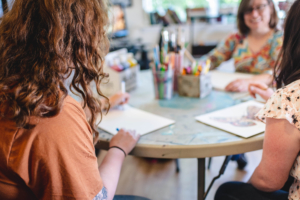Colorado Recovery’s Art Group Allows Clients to Explore Their Feelings
 Art can be helpful in healthcare, whether as prescribed therapy, something you participate in for fun, or simply as part of the environment. “Creative arts therapy is used to help treat mental health conditions because it can improve focus, assist with processing emotions, improve communication, and increase self-esteem,” wrote the Mayo Clinic press editors last year.
Art can be helpful in healthcare, whether as prescribed therapy, something you participate in for fun, or simply as part of the environment. “Creative arts therapy is used to help treat mental health conditions because it can improve focus, assist with processing emotions, improve communication, and increase self-esteem,” wrote the Mayo Clinic press editors last year.
Colorado Recovery approaches mental healthcare based on a path to self-reliance through developing practical skills. Art is also part of the healing process facilitated at Colorado Recovery.
Peter Kamback is our vocational rehabilitation specialist and community organizer. He also leads a popular art group. “Recently we worked on creating artwork on a banner roll of paper,” he says. “We left it on display in our Treehouse to let people know that this is the kind of thing we’re doing and to get them to interact with it if they chose to do so. It’s a work in progress and anybody can contribute to it.”
The Treehouse is a social-vocational center run by and for Colorado Recovery clients. The program helps prepare our clients for success in relationships, volunteer work, education and training, internships, and job placements.
“Looking at a blank piece of paper presents the daunting decision of what to do with it,” explains Kamback who made the project collaborative. “Each client contributed a line to the paper and as we continued to add lines, it built this design. Once we had something down on paper, we could fill the spaces however we wanted to. We could explore and had the freedom to express whatever we’re feeling.”
Sometimes clients add art into their theme days. “We talk about things that are happening in our lives or how we feel about something and then express that in drawings or paintings.” Kamback often asks clients to focus on specific things. “It allows them to block out the chaos in our environment and focus on one thing—even if it is very simple like coloring in. We’re all doing it together; we’re all engaged in the same activity. It levels the playing field and makes everybody feel a little more calm, a little more comfortable.”
Conversations tend to start naturally at that point. Kamback avoids planning sessions of the art group too meticulously. “I don’t want to make it look contrived but it also helps me learn what gets people engaged and involved.“
As people in the group collaborate they can see what the person next to them is doing and that may influence how they feel about it and how they want to interact with other people. “It’s a very open-ended exercise that allows participants of the group to explore within a basic framework.” Kamback participates himself to show clients that he does not represent a superior role that could be intimidating. I’m just another human like the rest of them.”
The art group is just one of many activities to promote inclusivity, socialization, and community building. Other recreational activities at Colorado Recovery include movie nights, talent shows, trips to the Boulder Museum of Contemporary Art, client-initiated activities, and even go-kart excursions.
“Groups are very valuable to our clients,” says Kamback. “They are safe spaces to feel comfortable and interact with one another.” Creative socializing such as the art group is an integral part of the groundbreaking approach to mental health treatment pioneered by the late Colorado Recovery founder Richard Warner. Recovery from serious mental illness requires that patients retain a sense of empowerment—a belief in their ability to take charge of their lives and manage the complex challenges of their illness.
At Colorado Recovery it is our mission to help adults with serious mental health issues stabilize their illness, minimize symptoms, improve functioning, and enhance each person’s social inclusion, quality of life, and sense of meaning in life.
If you have questions about our recovery model or our services to treat schizophrenia, bipolar disorder, and similar mental illnesses, call us at 720-218-4068 to discuss treatment options for you or the person you would like to help.


